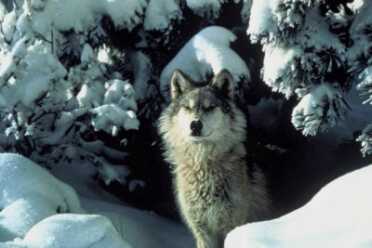The U.S. House of Representatives passed a bill earlier this month that would remove the gray wolf from the Endangered Species List in the lower 48 states. Dubbed the “Manage our Wolves Act,” H.R.6784 passed the House on a bipartisan 196-180 vote.

Gray wolves could be removed from the Endangered Species list, but that doesn’t mean states will open hunting seasons. (Photo: Wikimedia Commons)
The bill is sponsored by three Republicans and a Democrat, all from northern and western states.
“The gray wolf has recovered,” the bill’s sponsor, Sean P. Duffy, told Wisconsin Public Radio. “When you have endangered species, that’s when the federal government will step in … but when a species has recovered, we give it back to the states.”
A perennial threat to farmers and ranchers, gray wolves were largely exterminated from the continental United States by the mid-twentieth century. The species was placed on the Endangered Species List in the 1970s, and since then the population has recovered in the western Great Lakes states of Michigan, Minnesota and Wisconsin, as well as in the Northern Rockies and Pacific Northwest.
The Associated Press reported earlier this month that the U.S. Fish and Wildlife Service is planning to delist gray wolves from the Endangered Species Act due to the population’s recovery. The Obama Administration tried to do the same in 2012, but their decision was overruled by a federal judge in 2014.
SEE ALSO: Looking for Big Mule Deer
The House bill would both remove the protections for gray wolves and bar the courts from reviewing the decision.
“The problem has been in the activist courts,” Duffy noted. “When our judges are imposing their beliefs outside of the science behind a movement to delist, that creates a real problem.”
Some Democrats and animal rights groups have blasted Duffy’s bill as a last-ditch effort by Republicans to score a win in a lame-duck Congress.
“This final, pathetic stab at wolves exemplifies House Republicans’ longstanding cruelty and contempt for our nation’s wildlife,” Brett Hartl, government affairs director for the Center for Biological Diversity, told the AP.
“The American people overwhelmingly support the Endangered Species Act and the magnificent animals and plants it protects,” Hartl continued. “We don’t expect to see these disgraceful anti-wildlife votes next year under Democratic control of the House.”
Supporters see the House’s move as less related to political party than region of the country.
SEE ALSO: Conquering Cover – A Guide to Calling Coyotes Anytime, Anywhere
“Those who don’t live in the area where the wolf has recovered, they don’t really get what’s going on,” Duffy pointed out. “But when you live in the northern part of Wisconsin and Minnesota or go on westward, it’s been a bipartisan issue of House members and senators.”
“It’s a very regional issue and the senators in the northern states are hearing from their constituents and it’s not partisan, it’s how do we effectively have tools to manage them,” Duffy said.
The congressman also clarified, however, that removing gray wolves from the Endangered Species List doesn’t necessarily open the door for wolf hunting. Instead, the bill is designed to move management from Washington, D.C., to the states.
“This is not being done so there can be a wolf hunt,” Duffy said. “This delisting is so farmers can protect their livestock.”
“The purpose of the [Endangered Species Act] is to help [gray wolves] recover, to populate and then to effectively manage and that’s where [we are] right now. We’re at the effectively manage stage.”
The bill now moves to the Senate, where its chances of passing are much less clear.


Wolves need to be managed intelligently. I’m tired of hearing repeated hunter complaints that wolves destroy deer herds, elk herds, moose herds, ad infinitum. The fact of the matter is that they prey first on sick and injured game animals, as those critters require the least amount of energy to be expended per kill with the greatest reward – i.e. food protein. Interestingly enough, I recently heard from a Wisconsin DNR biologist that their department is reviewing analytics that suggest that wolves may be a hugely beneficial factor, and perhaps the best tool, in curbing the spread of chronic wasting disease among deer and other game animals, precisely because they tend to take the infected critters out of the population before others, thus limiting the opportunity for the disease to spread. Don’t get me wrong, I’m totally in favor of delisting them – I’m just also in favor of intelligent management of their populations based on scientific facts and not emotion, old wives tales or the Disneyesque fantasies spouted by tree huggers and animal rights activists.
The goal of the Endangered Species Act was never to protect in perpetuity any species. Its goal was and continues to be giving complete blanket protection to species in drastic decline and in danger of becoming extinct. Removing a species from that “endangered” list because it is no longer endangered is a success story, not something anyone should protest unless of course, one works for the Center for Biological Diversity.
A quick check of the Center’s website shows that their staff consists overwhelmingly of attorneys, self-styled media activists and fund raising specialists. Staffers in those categories outnumber staffers with even a minimally scientific background by about 15 to 1. They aren’t protecting grey wolves. They are protecting their paychecks.
“This final, pathetic stab at wolves exemplifies House Republicans’ longstanding cruelty and contempt for our nation’s wildlife,” Brett Hartl, government affairs director for the Center for Biological Diversity, told the AP.
Is this the kind of trash you have to put in your headlines? Are you owned by CNN? Pay attention to what you write.
This wasn’t the authors words. He was reporting what those against this legislation are stating.
Wolves not only are a threat to Farmers livestock but in the UP they are so out of control that they enter towns and villages. They also have critically hurt the local Whitetail deer herd.